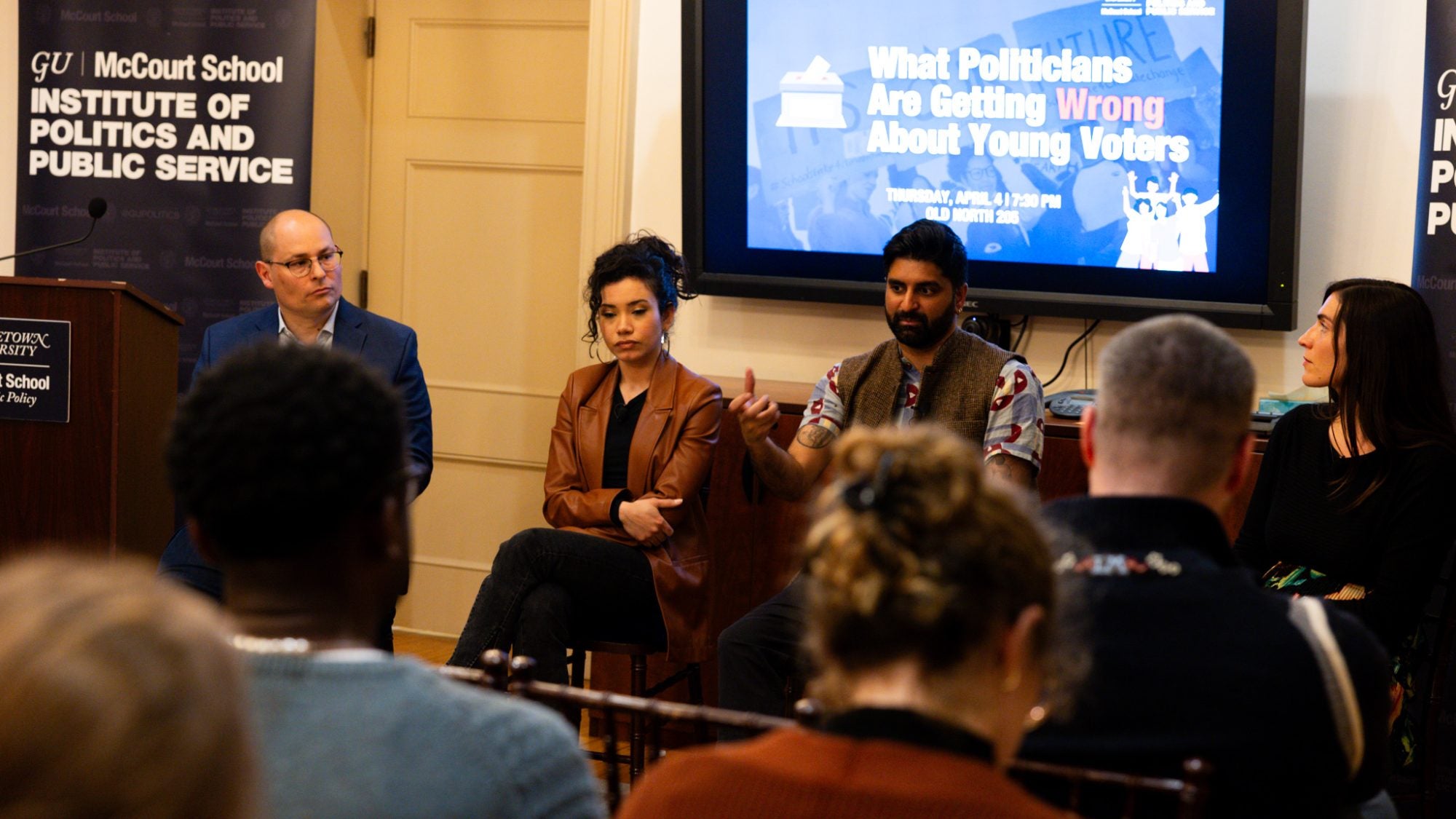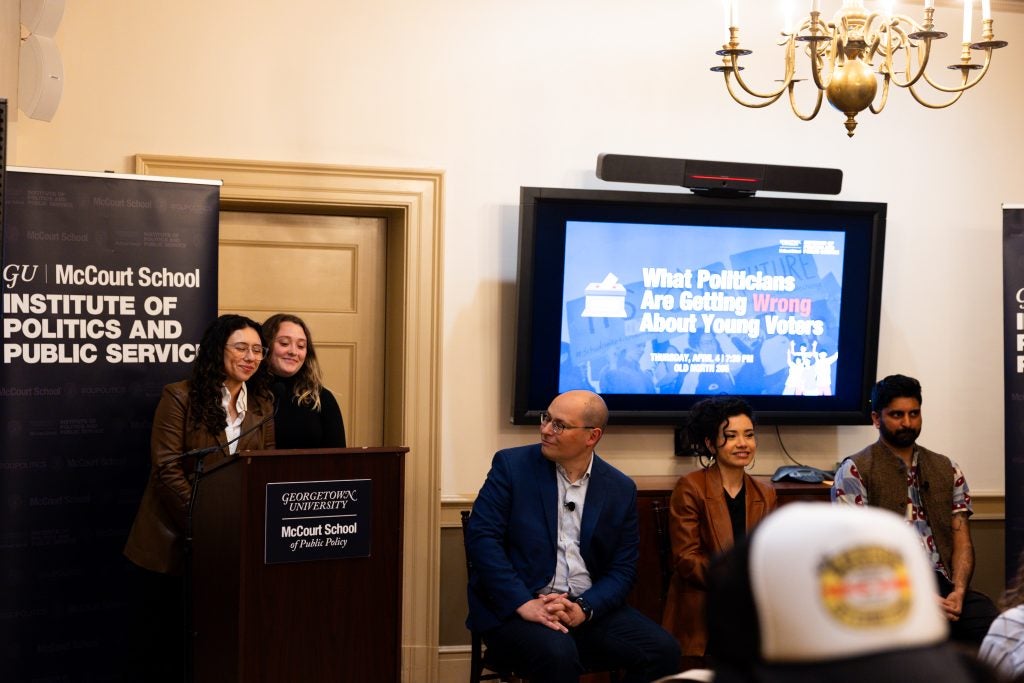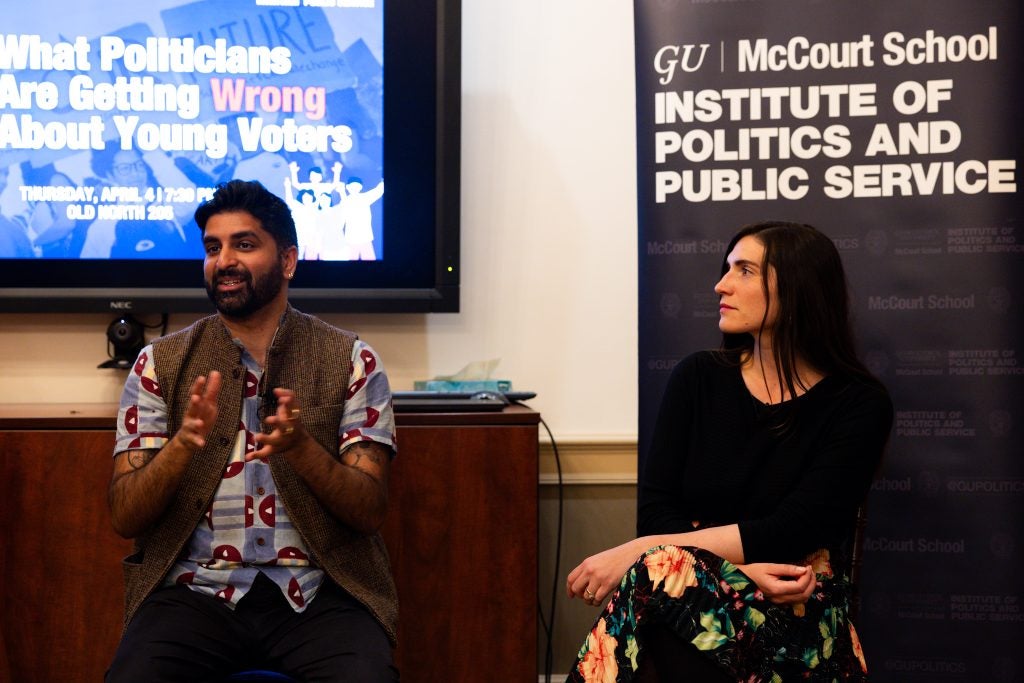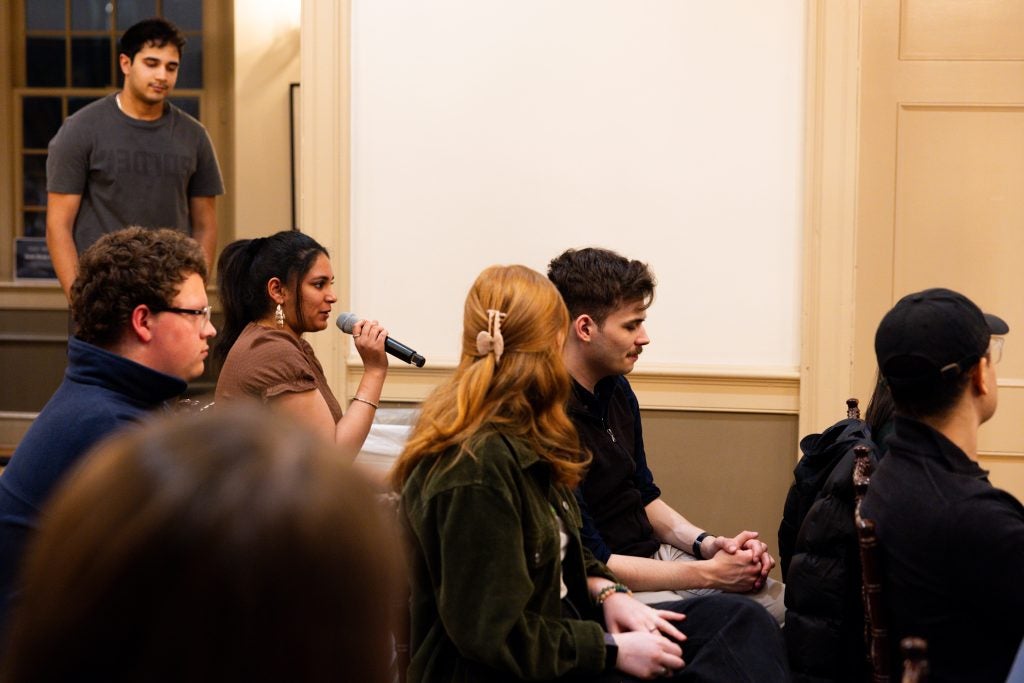On Thursday, April 4, 2024, GU Politics hosted a panel on the role of young voters in the 2024 election cycle. Students filled Old North to hear from Laura Barrón-López, Spring 2024 GU Politics Fellow and White House Correspondent for PBS NewsHour; Waleed Shahid, senior democratic strategist and former Spokesperson for Justice Democrats; Patrick Ruffini, Republican pollster and Founding Partner of Echelon Insights. The panel was moderated by Allegra Kirkland, Politics Director for Teen Vogue.
Introducing the event were Olivia Mason (C ‘26) and Anaís López (MPP ‘24) – two students currently on Barrón-López’s Student Strategy Team.
Kirkland started off the discussion by identifying apathy about voting as a major problem among young people and asked Barrón-López to elaborate on how this apathy will impact the 2024 presidential election. Barrón-López emphasized that the election outcome will come down to a few key swing states where votes really matter. She thinks young voters will be an important demographic and explained that while a majority of young people supported Biden in 2020, polls show support for him has waned.
Ruffini agreed that some young voters are shifting to support Trump and others are just tuning out. He added that not engaging at all is a problem.
Kirkland then asked about partisanship among young voters and the implications of more and more young voters identifying as Independents instead of Democrats or Republicans. Shahid responded that the identity shift is partly a symptom of America’s two-party system.
“So much of our politics is determined by how much you hate the other party,” Shahid said. “That dampens a lot of enthusiasm for partisan identification.”
Commenting on the willingness of some young voters to shift more conservative, Barrón-López noted that the youngest voters – 18 to 21-year-olds – were so young during Trump’s presidency that they do not remember him and may be more inclined to vote for him in 2024.
Kirkland asked panelists why they thought young voters focus their energy more on local elections and issue-based organizing than supporting party politics. Shahid noted that current societal issues seem too big to solve through supporting traditional Democratic candidates. Additionally, gridlock, when it comes to actually producing legislation, dampens support for the Democratic party and for looking toward elected representatives for change.
“Young people have focused their efforts on shaping public opinion,” Shahid said. “But politics isn’t only about changing public opinion.”
Ruffini agreed that political institutions and democracy do not seem to be working well for the next generation of voters. He cited the candidates’ ages and how they are portrayed as a factor in young voters’ political identities.
“The problem with Joe Biden is not that he is old,” Ruffini said. “But that to many young voters, he represents an old politics.”
He explained that Biden appears to embody the establishment with his rhetoric around protecting democratic institutions, while Trump has instead set himself apart from the traditional establishment and even though he is nearly as old as Biden.
“Donald Trump is effectively a third-party insurgent candidate running as a Republican.”
Kirkland then asked panelists what they think will motivate voters to actually turnout.
“I would be frankly surprised if turnout amongst young voters is lower than 2020,” Barrón-López said, while acknowledging the possibility of primary voters who voted uncommitted staying home.
Shahid remarked that the economy is the top issue for young voters, followed by climate change and the Israel-Hamas war and spoke about the importance of Biden focusing on these key policy issues.
Students then had the opportunity to ask the panelists questions. Sneha Puri (MPP ‘24) asked panelists why we hear more about Biden’s age then Trump’s age and how this messaging impacts the youth vote.
Barrón-López emphasized how the Republican party has focused their strategy on attacking Biden’s age and noted that information targeting Biden’s has been more prevalent on platforms like Tik Tok that are heavily used by Gen Z.
Shemaiah DeJorge (C ‘27) asked what substantive policy issues Biden should focus on for young voters. Shahid indicated even when Biden announces major policy plans such as lowering prescription drug prescriptions – his messaging is not engaging or exciting.
“We are in a media environment driven by conflict and clickbait and memes,” Shahid said. While Trump is very good at engaging with this, Shahid noted that Biden’s messaging isn’t reaching young voters in the same way.
Another student asked panelists about the social conservatism of many minority groups and how this impacts the shift to the right among young voters.
Ruffini noted that polling indicates shifts in the attitudes of young non-white men. He noted that loyalty to the Democratic community among minority voters is breaking down.
“People are more voting their ideology or their values,” he said.
Shahid emphasized the major cultural shifts happening in America and explained that voters care less and less about allyship.
“Democrats and progressives need to figure out how to make arguments about solidarity, about multi-racial democracy, around civil rights of all communities that create a collective interest,” he said, “and not just pit self interests against each other.”
Prior to the panel Kirkland and Shahid had the opportunity to meet with different student groups on campus. Kirkland gave a career chat on her career in journalism and offered students her advice and insights on digital journalism. Shahid met with Georgetown College Democrats to have a conversation on the role of progressives within the Democratic party, which spanned foreign policy and the 2024 election.
This article was written by Jane Wright, a first-year student in the McCourt School of Public Policy.



